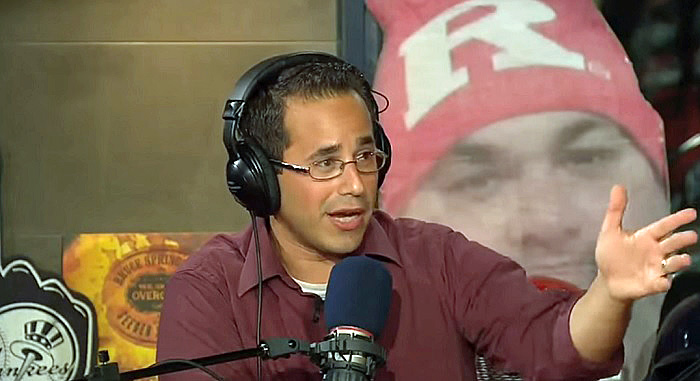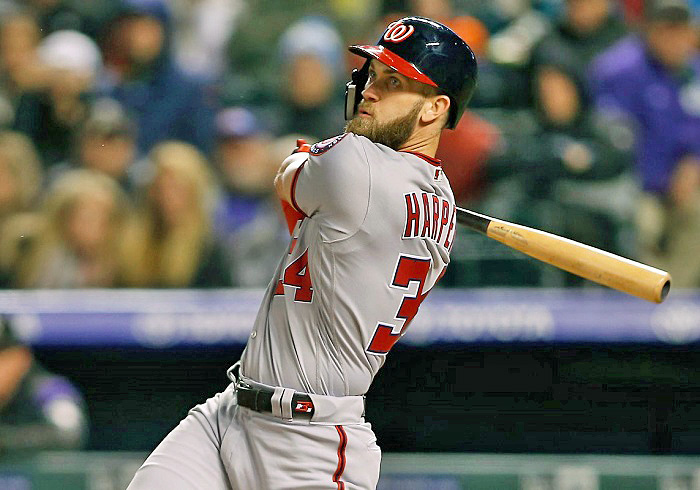During MLB Network Radio’s ‘Inside Pitch’ show on Sirius-XM radio on Tuesday morning, show host Casey Stern brought up a topic which, to that point, I had never heard of or even remotely considered. Stern said that he wouldn’t be the least bit surprised if highly coveted (but ridiculously expensive) perennial All-Star outfielder Bryce Harper – through super agent Scott Boras – became major league baseball’s first-ever double opt-out clause player.
It’s no secret that most baseball fans – at least Dodger fans – adamantly hate opt-out clauses. I mean, who can forget the tremendous animosity and then the unbearable anxiety that Dodger fans went through, first with former Dodger Zack Greinke and then with current Dodgers ace Clayton Kershaw, when they exercised and declined their respective opt-out clauses over the past two seasons?
What Stern suggested – or at least implied could happen – is Harper accepting a shorter term contract than the 10-year deal he was hoping for (but with no known takers) that would include opt-outs after, say, two and then perhaps four or five years into the deal.

(Video capture courtesy of The Artie Lange Show)
Whether or not anything like this has been brought to the table in the past by a player or agent is anyone’s guess, but this was the first time that I had ever heard of such a proposal which, in my opinion, is a brilliant idea; and I am among those who detest opt-out clauses.
Let’s take a closer look at this unique but rather novel concept.
Suppose that Harper (via Boras) agrees to sign with the Dodgers for a five or six-year deal (instead of the 10-year-ish deal he was seeking) with a higher Annual Average Value (AAV). If he continues on with his (potential) Hall of Fame career and continues to put up big numbers, and has an opt-out clause after, say, two and four years, he could potentially land an even more lucrative contract, either back with the Dodgers or elsewhere. If it were indeed with another team, the Dodgers would then be off the hook for the remaining money and time owed to him under his original contract with them.

(Photo credit – Russell Lansford)
Obviously, Harper would still be the big winner in such a deal, but the Dodgers would potentially save a boatload of money in the event that the (now) 26-year-old Las Vegas, Nevada native and 2010 number one overall draft pick (out of College of Southern Nevada) signs elsewhere … with his best years more than likely behind him.
Stay tuned…




 January 3rd, 2019 at 8:00 am
January 3rd, 2019 at 8:00 am  by Ron Cervenka
by Ron Cervenka  Posted in
Posted in 

You and I discussed this possibility on Dec. 26 “Dodgers not out on Harper just yet.” I wrote, ” How will this turn out — I believe Boras and Friedman will find a way, probably with a record setting AAV and multiple opt outs over a 5, or possibly 7 year guarantee.” And then responded to your reply “I’m not sure how the options will play out, but Friedman and Boras are smart guys and will find a way to make it work. I think Dodgers could give Harper right to opt out after 2nd year and 3rd year in 5 year contract.” I mentioned the possibility of multiple opt-outs back in the Fall when the Hot Stove League was just starting to warm. To me multiple opt outs makes sense rather than a 10 year guarantee.
I do indeed recall that, but this was the first time I had heard anyone from the national media mention it.
Maybe you and I should start our own national radio show. lol!
Love the ‘outside of the box’ thinking.
J.D. Martinez’s $110M/5 yr contract with Boston has opt-outs after years 2, 3 and 4.
Opt-out clauses ONLY benefit the player. The team just assumes more risk when signing a player to a long-term contract with opt-outs.
The opt-out will only be exercised if the team made a good signing. If the contract turns out to be an anchor the player would NEVER opt-out. A win/win situation for the player and a lose/lose for the team.
The contract Seattle just signed with Kikuchi (the Japanese pitcher) has an interesting twist on how a team can capture some upside while including a player opt-out if the player turns out to be really good.
Kikuchi deal was very innovative. I wonder who suggested it to Dipoto 🙂
Stern did not mention Martinez’s multiple opt-out clause contract and I was unaware of it.
Agree 100 percent that opt-out clauses only benefit the players, but if that’s what it takes to get these guys, I don’t see them going away anytime soon.
Ron, and as was mentioned, these are somewhat a better situation than being saddled with some crazy 10 year deal.
Hello there Boxout7. These opt out clauses do benefit the player because obviously he stays if the year or years he put in result in a less than stellar performance on the field. My take is that while opt outs benefit the players, the teams are not so much worse off because let’s say there would have been 2 or 3 more years on the total deal, at least the club saves the $$$ it would have cost them in salary that said player would have made and thus that salary saved due to the player opting out can go to fill other needs as they come up. So in effect, it’s not a total lose lose situation in that case.
Agree with this as well. The best example is Kershaw’s opt-out. Obviously, no one wanted him to leave the Dodgers, especially Friedman (et. al.). Heck, even Kersh didn’t want to leave.
What the opt-out did was generate cordial dialog between the Dodgers and Casey Close which, of course, ended with Kershaw getting a very good three-year contract extension that everyone was ok with.
PS: I still don’t like them though.
Not sure I am following you PaulDodgerFan1965.
If the player opts out with 2-3 more years on his deal, isn’t he opting out because he feels that he can get more on a new deal? If he is correct, the old team just lost a contract that had “present value” which would be at least be a trade asset. The present value of the trade asset would be the difference between the new contract value and the old contract value.
Of course as we all agree, if a new contract value would be less than the old contract value, the old team has an anchor and will be stuck paying for the remaining years on the old contract.
Kershaw, in my opinion, was a special case. He wanted to stay and Dodgers also wanted him to stay. I think he could have gotten more total dollars on a new contract, more years at a smaller AAV. Kershaw could lose the difference between the more total guaranteed dollars and the $93M he signed for, if everyone knows he’s finished three years from now. Happily, he was willing to risk those dollars to remain a Dodger.
From the Dodgers standpoint and only from a dollar standpoint, I think they would have liked for him just to opt-in and reevaluate everything in two years.
Tell us about the Kikuchi deal. Something unique there?
I recommend that you read “Follow-up notes on Kikuchi’s Deal with Mariners” on MLB Trade Rumors.
As SoCalBum notes, MLB Trade Rumors is a VERY good read to keep up on the latest happenings. Following is a link to an earlier article there explaining the contract.
https://www.mlbtraderumors.com/2019/01/mariners-sign-yusei-kikuchi.html
Not sure exactly what you are / were suggesting, but unless something is (generally) connected to the Dodgers, I / we (generally) do not write about it.
As Bum and Box noted, MLB Trade Rumors is a very good source of information. Granted, most of it is indeed “rumors”, but then, that’s what they do.
As for specific details on Kikuchi, check out this piece by former ThinkBlueLA writer Jacob Rudner:
https://dodgersway.com/2019/01/02/dodgers-kikuchi-harper/2/